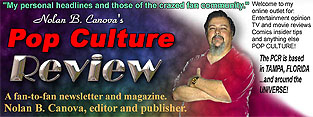

 |  |
|
Frontpage La Floridiana Movie Review Murder/WooWoo Mike's Rant Matt's Rail Viddywell PCR Archives 2002 2001 2000 Crazed Fanboy homepage PCR 2002 Home |

| Part 10: | ||
 | ||
|
Blues roots, by the mid 1930s & 40s were dying out as bluesmen sought to record more commercial numbers. The field hollers, spirituals, and chaingang chants were left to die with their era as bluesmen discovered the electric guitar and big bands were in full swing. Also African-Americans were trying to forget their slave past. Most African-Americans were trying to further themselves in the world and when they moved to the big cities they left their traditions behind.
Though there were other field trip recordings pre-dating Lomax's, and even pre-dating the first blues records, Lomax's wielded the greatest recordings. In 1932 Lomax proposed to publish "American ballads and folk songs". After he saw that recording these musical treasures was a possibilty Lomax proposed to the Library of Congress the idea of collecting a whole library of American vernacular music. The Library of Congress agreed and equipped him with a recording device to take on his field trips. Because he had documented cowboy songs during field trips to Texas since he was in his twenties, Lomax was more than a capable choice. So in mid-June of 1934 with his 17-year old son Alan, John was on the road again.
The Library of Congress's disk recorder finally arrived on July 15 while they were in Baton Rouge, Louisiana. Lomax was confident that Louisiana and Mississippi would be where he would find the real gems. Among the gems they found was, of course, Lead Belly. Lead Belly recorded several songs for Lomax and it somehow convinced the Governor to pardon him. From there, Lead Belly served as a guide for the Lomaxes. Lead Belly would accompany John and his son on the field trips and would often show them the best places to look and he would give detailed encyclopedic histories of the songs that Lomax was recording.
Lomax continued to document songs all over the nation well into the 1950s with his son Alan taking over in the 60s. Without his detailed study, documentation, and the help of Lead Belly, the roots music of America would be long lost. These songs which at one time were passed down from generation to generation are now non-existant in current society. They may be forgotten, but, because of the Library of Congress recordings, these songs will never be lost. 
Reissues of old folk and blues songs were being released on vinyl in the 1950s to white audiences. Any youth in the 50s who felt alienated or was just plain sick of mainstream pop music found comfort in the sorrowful tunes of Charlie Patton or Robert Johnson. Some of these kids naturally formed their own bands such as Cream, The Rolling Stones, The Who, The Greatful Dead, etc. These bands played a unique blend of rock fused with traditional blues. White audiences picked up on it and began searching for the real thing. That's when the revival blew wide open. Suddenly almost overnight obscure forgotten legends like Skip James, Mississippi John Hurt, and Blind Gary Davis became icons. Of all the bluesmen who withstood the test of time ,Son House faired the best. His 1965 sessions were phenomenal and still retain their impact to this day. Though in recent times the blues revival has ended, the first wave of bluesmen are dead, and the second wave is fading. It would seem that the blues went with them. The voice of a people was no longer needed, so as it evolved into other things such as rock 'n roll, rap, and R 'n B, the blues' original form diminished. But you only need to listen to the music of Johnny Cash, or rock bands like Nirvana, Pearl Jam, or any other confessional rock band to hear the blues' enormous impact on the music world. The blues' roots and origins are truly gone, for the peoples and culture that played them have changed or no longer exist. Perhaps years from now it will resurface when it is needed but for now it made itself heard. The fact that self-taught vagabond musicians could inspire countless decades of musicians is testimony enough to the blues potentcy. No one can say what the future holds for the blues but its past is a sound that cannot be denied. And I can't tell my past Lord it seems like every minute sure goin' to be my last. (Future Blues) --Willie Brown
Suggested Listening Most of these are still in print on Cd's, tapes, and even vinyl. The greatest pleasure of course is listening to the actual 78 rpm records of these artists but as I have found out, it can get addicting and pricey, so for the beginner I would start with the above.
I hope the readers of PCR have enjoyed learning about America's great musical heritage and that my efforts have not been in vain.
--Terence Nuzum
|
"The Enlightenment" is ©2002 by Terence Nuzum. Webpage design and all graphics herein (except where otherwise noted) are creations of Nolan B. Canova. All contents of Nolan's Pop Culture Review are ©2002 by Nolan B. Canova.